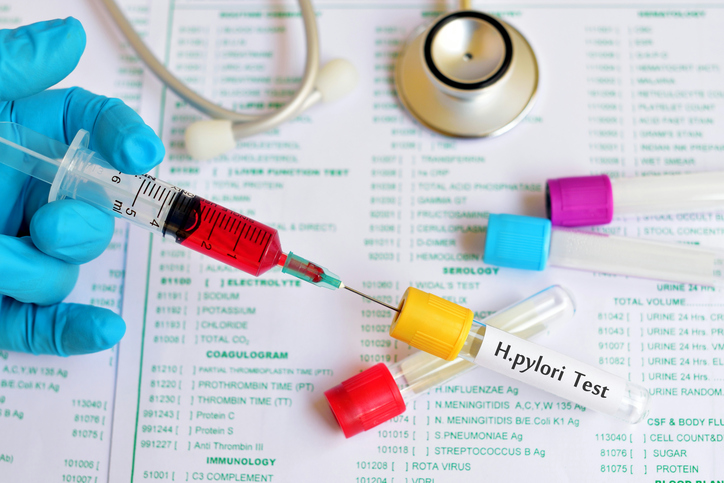H.Pylori. What it is, how it affects bariatric surgery and how to test for it

H. pylori and how it affects bariatric surgery
When undergoing bariatric surgery, you are sent for several tests, most of which you may not understand. Some of these tests include:
- Blood work. To create a baseline for your vitamin and mineral levels, we take blood work. This helps to check for deficiencies and determine if taking more vitamins is necessary after surgery.
- Cardiac clearance. We ask for a cardiac clearance to ensure your heart and body can withstand anesthesia as well as healing from surgery.
- EGD or endoscopy. Furthermore, we ask patients to have an esophagogastroduodenoscopy performed. This is better known as an EGD or endoscopy.
This post focusses on the importance of an endoscopy before bariatric surgery.
H. Pylori. Why you should get an endoscopy before bariatric surgery
There are several reasons that having an endoscopy is beneficial before surgery. One of them is to test for the bacteria Helicobacter pylori. Most will know this as H. pylori, a bacterium that infects the stomach. Several of our patients are detected with H. pylori and need medication. However, most patients have no idea what this bacterium is or where it came from.
H.pylori may be present in half of the world’s population according to the Mayo Clinic. However, most will not know they have it. There are several cases where people show no symptoms of being infected with this bacterium. How H. Pylori is transmitted is still being studied but there are a few concepts.
- One of them is that it may be transmitted from person to person by direct contact with saliva, vomit or fecal matter. This would help support the theory that it is mostly contracted during childhood.
- Second, environment plays a role in contracting H. Pylori. For instance,
- If you live in a crowded space, such as college dorms.
- Those living with someone who has h.pylori are likely to get it.
- People in developing countries are more likely to contract the bacteria due to limited clean water or contaminated food.
Symptoms of H. Pylori
If you believe you have h. pylori, some symptoms you may experience are
- Burning pains in your stomach,
- Nausea,
- Decreased appetite,
- Burping,
- Bloating or
- Unintentional weight loss.
For bariatric patients, the bacteria can increase the chance of infection right after surgery. This will negatively affect healing and increase the likelihood of developing an ulcer. It will also cause inflammation of the stomach lining and possible stomach cancer. According to the mayo clinic, 10% of the population with h. Pylori will end up with an ulcer. The risk is even higher for bariatric patients.
How Tests for H.Pylori are done
In the past, doctors have used blood tests to test for h.pylori but there are more effective ways now. These include:
An endoscopy
One of the best tests is to have an endoscopy done. First, you will be sedated. Then, a doctor will put a long flexible camera down your throat, esophagus, stomach and into your small intestine. The camera will help to pick up any irregularities so the doctor can remove the tissue and test it for h pylori.
A breath test or stool test
For such tests, you will swallow a pill, liquid or pudding substance that contains carbon molecules. If you are infected with h pylori, the carbon molecule will be released when you breathe after the solution is broken down in your stomach. It can also be detected in a stool sample.
With both the breathing and stool test, you will be asked to stop any proton pump inhibitors (ppi) as they may interfere with the results. Proton pump inhibitors are more commonly referred to as acid suppressing drugs. Examples include omeprazole, prilosec and so on.
How to protect yourself against h. Pylori
In most cases, H. pylori is not severe but you can take preventative measures such as:
- Always wash your hand after using the bathroom as well as before eating.
- More so, make sure that your foods are properly prepared. Wash all your produce thoroughly.
- Finally, only drink water from a clean, safe source.
If you happen to have H pylori, your doctor will likely prescribe an antibiotic (PrevPac). Additionally, you will be given an acid suppressant to reduce the acid being produced in the stomach.
References: The Mayo Clinic, Diseases and conditions H pylori infection
We are here to help
I hope this article was helpful. Let me know.
Also, we are here at Tri State Bariatrics to answer any of your questions about more than just ‘Loose Skin from Sleeve Bariatric Surgery Solutions’.
Call us at 855-328-7483 or Contact us here.
Visit us here https://www.tristatebariatrics.org
Blog/Articles: https://www.tristatebariatrics.org/category/all-articles/Testimonials: https://www.tristatebariatrics.org/testimonials/
First Step Seminar Sign up: https://www.tristatebariatrics.org/first-steps-seminar/
Contact us: https://www.tristatebariatrics.org/contact-us/
Surgery information: https://www.tristatebariatrics.org/#middle-section
Middletown Ny, Suffern NY, FishKill Ny locations: https://www.tristatebariatrics.org/locations
You can also COME TO OUR MEETINGS if you are struggling with weight loss but are not sure weight loss surgery is for you. We are here to listen and support you to make the right decision.












